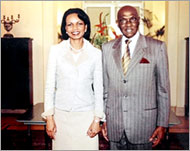Sudan seeks end to sanctions
Sudan says it will focus on the lifting of sanctions imposed on Sudan, in a planned meeting with the US Secretary of State Condoleezza Rice in Khartoum on Thursday.

Foreign Minister Mustafa Osman Ismail expressed the hope that Rice’s visit “would help pave the way for normalising relations between Khartoum and Washington”, Aljazeera reported on Wednesday.
Meanwhile, Rice held out the possibility of sending an ambassador to Sudan for the first time since 1997, in a sign of improving ties after the installation of a new government of national unity.
“We are looking to the day when we can put [ambassadorial] representation there, because obviously things are moving pretty quickly in Sudan,” Rice told reporters en route to Senegal, where she arrived on Wednesday on her first trip to the African continent as secretary of state.
The return of a US ambassador would show international acceptance of the Khartoum government, something which Sudan‘s leaders covet, according to US officials.
But Rice said such a move would depend on Khartoum resolving a conflict in the western region of Darfur and being removed from a US list of state sponsors of “terrorism”.
Rice visit
At a news conference in Dakar, Rice said she would demand on a visit to Khartoum and Darfur on Thursday that Sudanese leaders act to stop the violence in the region.
 |
|
Rice (L) will also visit Darfur on |
“I will start from the point it could also be a new day if this new government … exercises its responsibility towards all the people of Sudan, including the people of Darfur,” she said.
“We don’t rely on words, we rely on actions,” she added. “We have gotten some help from the Sudanese government but by no means enough.”
Violence has abated this year in Darfur, after tens of thousands of people died and about 2 million were driven from their homes following a rebel uprising in early 2003.
Senegal‘s Foreign Minister Cheikh Tidiane Gadio said his government was “totally dissatisfied” at the African Union’s failure to stop the killing in Sudan despite sending troops to the region.
Betting on Garang
The United States hopes new vice-president and former southern rebel John Garang, who has frequently visited Washington, will help improve ties between the two countries.
Ambassador Tim Carney left Khartoum in 1997 after the US imposed sanctions on Sudan for what it said was “support for terrorism”. The current top US representative in the country is a charge d’affaires.
 |
|
US missiles destroyed the El-Shifa |
Frosty US ties with Khartoum, where Osama bin Laden lived from 1991 to 1996, reached a low in 1998 when Washington launched missiles destroying the El-Shifa pharmaceuticals plant it said produced chemical weapons and was linked to bin Laden.
No evidence of either accusation was substantiated.
Sudan’s foreign minister at the time said US allegations were based on “faulty intelligence” and had requested the UN investigate the matter.
Sanctions fallout
The El-Shifa pharmaceutical company was referred to as “the pride of Africa” at its opening and provided affordable medicine for people as well as all the locally available veterinary medicine in Sudan.
It produced 90% of Sudan‘s major pharmaceutical products and was a key supplier to Iraq under the UN’s food-for-oil programme.
Sanctions against Sudan has made it impossible to import adequate amounts of medicines required to cover the serious gap left by the plant’s destruction.
Thus, tens of thousands of people – many of them children – have suffered and died from malaria, tuberculosis, and other treatable diseases.